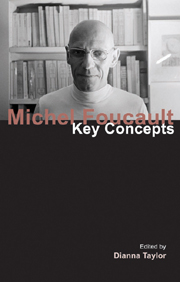Introduction: Power, freedom and subjectivity
Summary
Foucault the experimenter
Michel Foucault was not a systematic thinker. He referred to himself as an “experimenter” as opposed to a “theorist” (1991a: 27); eschewed the labelling of his work in terms of existing categories; and asserted that “thinking differently” and self-transformation, rather than “validating what is already known”, lay at the core of his philosophical work (1990b: 910). “I don't feel that it is necessary to know exactly what I am,” Foucault states in a 1982 interview:
The main interest in life and work is to become someone else that you were not in the beginning. If you knew when you began a book what you would say at the end, do you think you would have the courage to write it? What is true for writing and for a love relationship is true also for life. The game is worthwhile insofar as we don't know what will be the end.
(1988: 9)In addition to being unsystematic, Foucault's work also challenges fundamental aspects of the Western philosophical tradition. As he sees it, philosophers have exerted much intellectual time and effort and devoted many pages to creating a dualistic and overly simplified worldview that valorizes aspects of human existence that provide us with a false sense of our own ability to gain certainty about the world, and to thereby become masters of it and ourselves. This worldview imbues us with a false and misguided sense of security that, nonetheless, because it is preferable to the threat that uncertainty appears to pose, ensures the reproduction and eventual systematizing of the same faulty thinking.
- Type
- Chapter
- Information
- Michel FoucaultKey Concepts, pp. 1 - 10Publisher: Acumen PublishingPrint publication year: 2010

